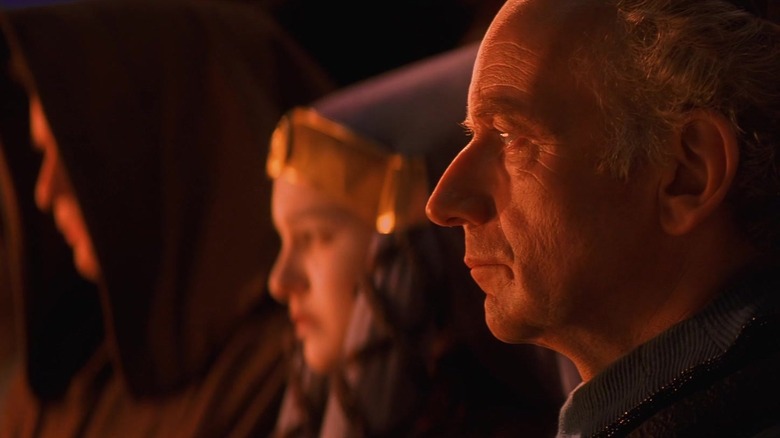Why Star Wars' Ian McDiarmid Refused To Learn Palpatine's Backstory
George Lucas has an obsession with world-building and backstories. Because he spent so long toying with the concept and setting of "Star Wars," long before he actually wrote what would become the first movie in the saga, a lot of concepts for what would come later (even as recent as "The Force Awakens") can be found in his earliest notes. Indeed, the whole story of the prequels originated from Lucas' own backstory and world-building for the Jedi and the Sith that he created before writing the original "Star Wars."
But just because the maker had these ideas in his head doesn't mean his actors had to study a fake history book for their roles. As Ian McDiarmid himself told Star Wars Insider before the release of "The Phantom Menace" in 1999, he didn't really dive into the backstory of Sheev Palpatine.
"Like everybody else, I've read the books and worked things out, but I think it's quite good that I know as little as I do," McDiarmid said. "I'm left with the best tools really, which are just the lines, the other actors, and the situation. He's a mysterious, dark character, but that suits me and suits him, because I wouldn't want to do anything to dispel the mystery, or to lighten the darkness."
In his words, what mattered, and what he knew, is what was on the screen. "Early on, he's a successful politician, who seemingly wanted the best for his planet, and through that want, he might progress." But underneath all that, there's the fact that "in a number of years, this is the most evil person who's ever dominated a planet, let alone the universe."
Palpatine's absolute power
In George Lucas' 1974 rough draft for the first "Star Wars," there was Cos Dashit, a weak-willed, low-level politician and failed upward until he became President of the Republic before becoming Emperor. Initially, he was a puppet, controlled by bureaucrats of the Empire like Tarkin, and he was never a Force user (or even a particularly clever individual).
It was only later that Palpatine became the mastermind of the whole saga and the puppeteer of every conflict in the galaxy, with the character being inspired by politicians like Richard Nixon and Dick Cheney. The final version of Palpatine was far from a clown, with McDiarmid telling StarWars.com in 2002 that the character "is more evil than the devil. At least Satan fell — he has a history, and it's one of revenge. But the Emperor — well, I don't know all the details, but who does of the Sith? — is an independent agent who just lives for the exercise of power. He doesn't know what scruples are, let alone have any."
The idea of the Emperor as a puppet is rather interesting. There are elements of that in the "Star Wars" sequels, where characters like Armitage Hux serve that purpose as a patsy in a position of power who doesn't have much agency. Even the trilogy's Supreme Leader Snoke is little more than a puppet, a placeholder until Palpatine somehow returned in "The Rise of Skywalker."

